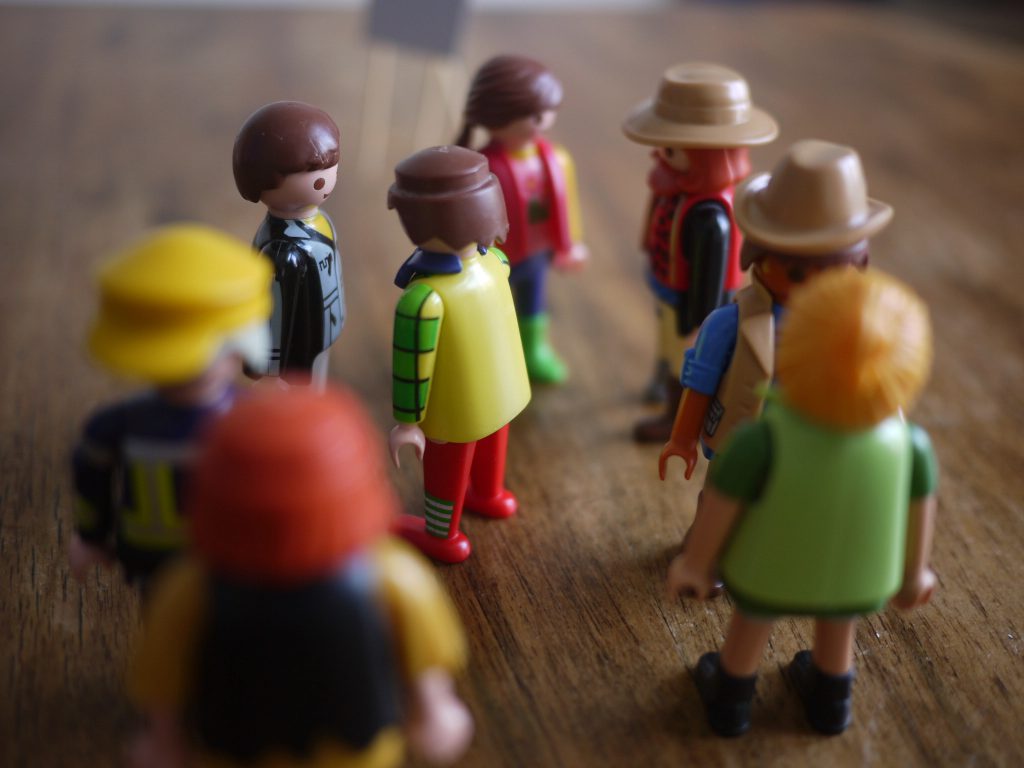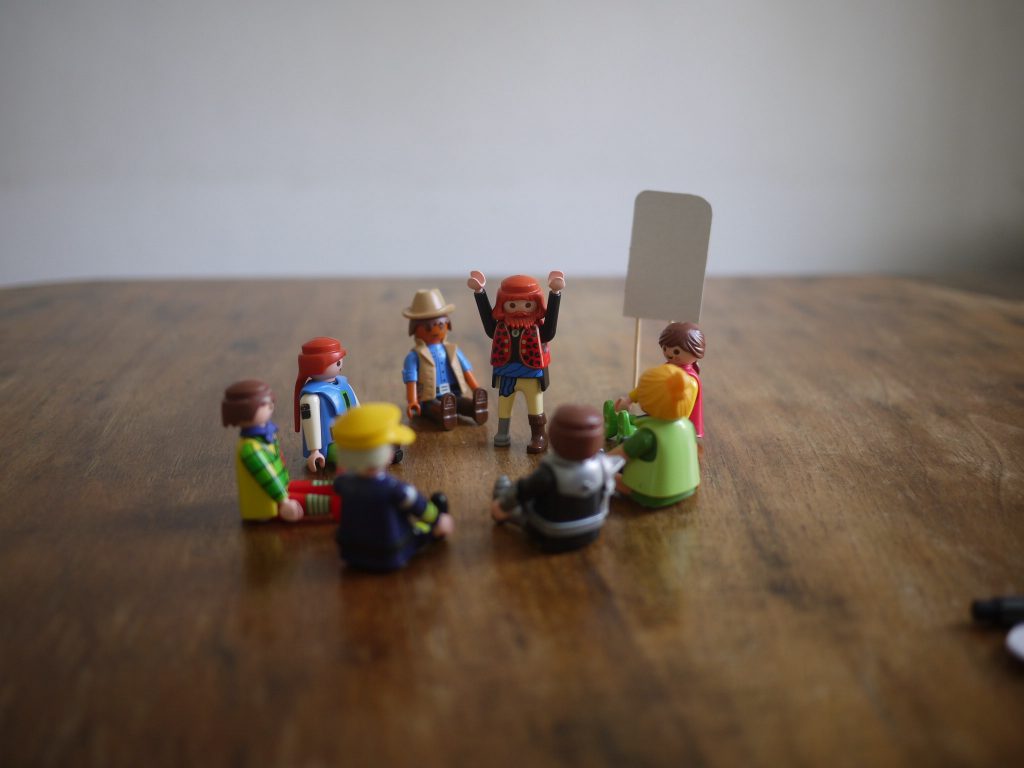Sometimes it’s not easy to harmonise different things.
Maria is still drawing on her paper when the others arrive. This time they meet in a garden in the city. Beate looks curiously over Maria’s shoulder „What are you doing?“ she wants to know. Maria sighs and explains that she is trying to form small groups for a course, but is getting nowhere. She would like as many diversity categories as possible to be taken into account and the small groups to be as heterogeneous as possible.
Beate is immediately in the middle of it, she loves puzzles, and bends over their notes with Maria. Paul and Rudi look at each other a little perplexed. „Maybe it’s a question of age,“ Rudi says, „but I’ve never spent so much time dividing the groups. I usually do it randomly.“ Yasmin laughs out loud „I think it’s more of a gender issue“ – and our five are already in the middle of today’s topic.
Falcon Crest, Knight Rider and the A-Team
Especially at the beginning of new groups, it’s all about finding common ground. We – as social beings – like to notice similarities between ourselves and others: on holiday we are happy when we meet people from our neighbouring village, and when we make new acquaintances it is initially also about sharing interests and preferences. We are happy to meet other vegetarians or dog lovers, or people who like the same sports as we do. Paul says that at his seminars, which last several days, the first evening is often spent talking about TV series people watched when they were young. „I already have a head start because I’ve experienced that many times. I can come up with Falcon Crest, the A-Team and Knight Rider and the matching theme songs. But then it also becomes immediately clear who wasn’t allowed to watch so much TV as a child or grew up in a different culture and doesn’t know these series at all. That immediately creates interest or irritation.„
Lining up to differentiate
At the same time, however, we also explore differences. As the group dynamic progresses, these become more and more important: differentiations take place. Yasemin reports that she often does line-ups at the beginning in order to make similarities and differences visible. “ It‘ s all about seemingly harmless questions, such as place of birth or the industry in which one works. Often, however, weightings become clearly visible. For example, if everyone was born in Austria and only one was born in Turkey, then cultural priorities become clear very quickly. Or if the group is made up of workers and only two employees.
The others nod. „Often there is a need to blur the differences at the beginning. Sentences like „but we’re all in the trade union“ or „but you’ve actually been in Austria since you were two, so you’re one of us anyway“ come up, a sentence I’ve often heard myself,“ Yasemin ends. „It’s actually funny,“ Maria says, „that we often have such a hard time with differences in the group. Yet the five of us are probably already quite different…“
Fruit salad advanced and milking cows
Our five spend the next hour talking about differences in their group. They learn that no one has ever pronounced Paul’s Polish surname correctly on the first try (except his Polish friends and family), that Yasemine speaks Russian and French in addition to Turkish and German, that Beate grew up in a small mountain farming village in Tyrol and can milk cows by hand, that Maria completed a carpentry apprenticeship before going to university, and that Rudi doesn’t have a driver’s licence and doesn’t even want to ride a bike on the street.
The newly discovered similarities and differences immediately lead to another half hour of two-way and three-way conversations. Then Maria brings the group together again: „This reminds me of a method I used to like to do with school classes. But maybe it’s also suitable for groups of adults: Fruit salad advanced.“
Just like in fruit salad, one person stands in the middle, but instead of saying what kind of fruit they have, they say something about themselves that they are convinced they share with many others in the room. Whoever has or can do that (for example, „I am in the union“ or „I know English“) has to change places. Of course, you can also use riskier things like „I can sing well“ or „I like mango ice cream best“. This often creates moments of surprise. As a further challenge, you can say things that you are convinced will be shared by very few or perhaps no one. Of course, there are also sensitive issues, such as religion, sexuality or political affiliation, but it is also exciting to see how the group deals with such topics. In this kind of fruit salad, no one has to expose themselves. If, for example, a category is unpleasant or I simply don’t want to position myself at the moment – I decide for myself whether I want to change places or not.“
Expert or outsider
Rudi definitely wants to try out the method. He finds it a good way to start the discussion about diversity and how different walks of life and horizons of experience affect a group.
„I usually look at it on an individual level,“ he says enthusiastically, „but of course it makes a big difference in the group. Just the question of how many others I then share a position with, or whether I am completely alone with an experience. That can make me an expert or an outsider.“ He looks at Maria’s note from the beginning, „now I also understand better why you put so much effort into the small groups. It can really make a lot of difference to the small group work whether there are many different or many similar realities in there.“ Maria nods. „But it’s really not easy to distribute the differences well…“
Diversity and intersectionality: opportunity or fig leaf?
Paul has to leave already, he has to pick up his children from a birthday party in the park, but Beate, Yasemine and Rudi still want to help Maria with her grouping. After 20 minutes of fiddling, they have found a good solution and have taken into account the categories age, gender, industry, origin, part-time/full-time employment, marital status and current living situation (urban/rural).
Beate remarks on intersectionality, that for some people many categories apply at the same time and still intertwine and reinforce each other. Yasmine confirms this and says with a laugh: „As a young woman of Turkish origin, I was very much in demand in many political contexts. I often had the impression that I was just the figurehead who was supposed to make the organisation look good to the outside world and that the usual suspects – middle-aged, Austrian men – ruled in the background anyway. That’s often the case, especially with organisations in a political context.“
Paul nods thoughtfully: „I never thought about it that way. I always thought it was cool that they promote young women, but I never thought about the fact that sometimes they are just a fig leaf in the front and are being burnt up a bit……“ They talk a bit more about the pitfalls of political representation work. Maria also finds it difficult that people quickly become responsible for certain issues just because they belong to that group. „Now there is more awareness, but before, if you were a woman, you were automatically responsible for the issue of equality, or if you were a foreigner, you automatically had to be interested in the anti-racism campaign. You probably do, because it directly affects your life, but it doesn’t exempt others from dealing with it as well.“
They make another appointment for autumn – in summer the various holiday plans overlap – and write Paul a text message to check whether he also has time. Paul, by the way, is the only one in the group who does not use WhatsApp, which has so far prevented the group from networking online as well. Access to and use of technology is another diversity criterion, the four others note. Following on from their discussion earlier, they plan to look at the issue of decision-making processes in groups, which are also very much shaped by different needs and realities of life.
Authors: Gerda Kolb and Irene Zavarsky
Lust auf mehr? Zu allen Beiträgen der Serie kommst du HIER!

Dieses Werk ist lizenziert unter einer Creative Commons Namensnennung-NichtKommerziell-Weitergabe unter gleichen Bedingungen unter gleichen Bedingungen 3.0 Österreich Lizenz.
Volltext der Lizenz



